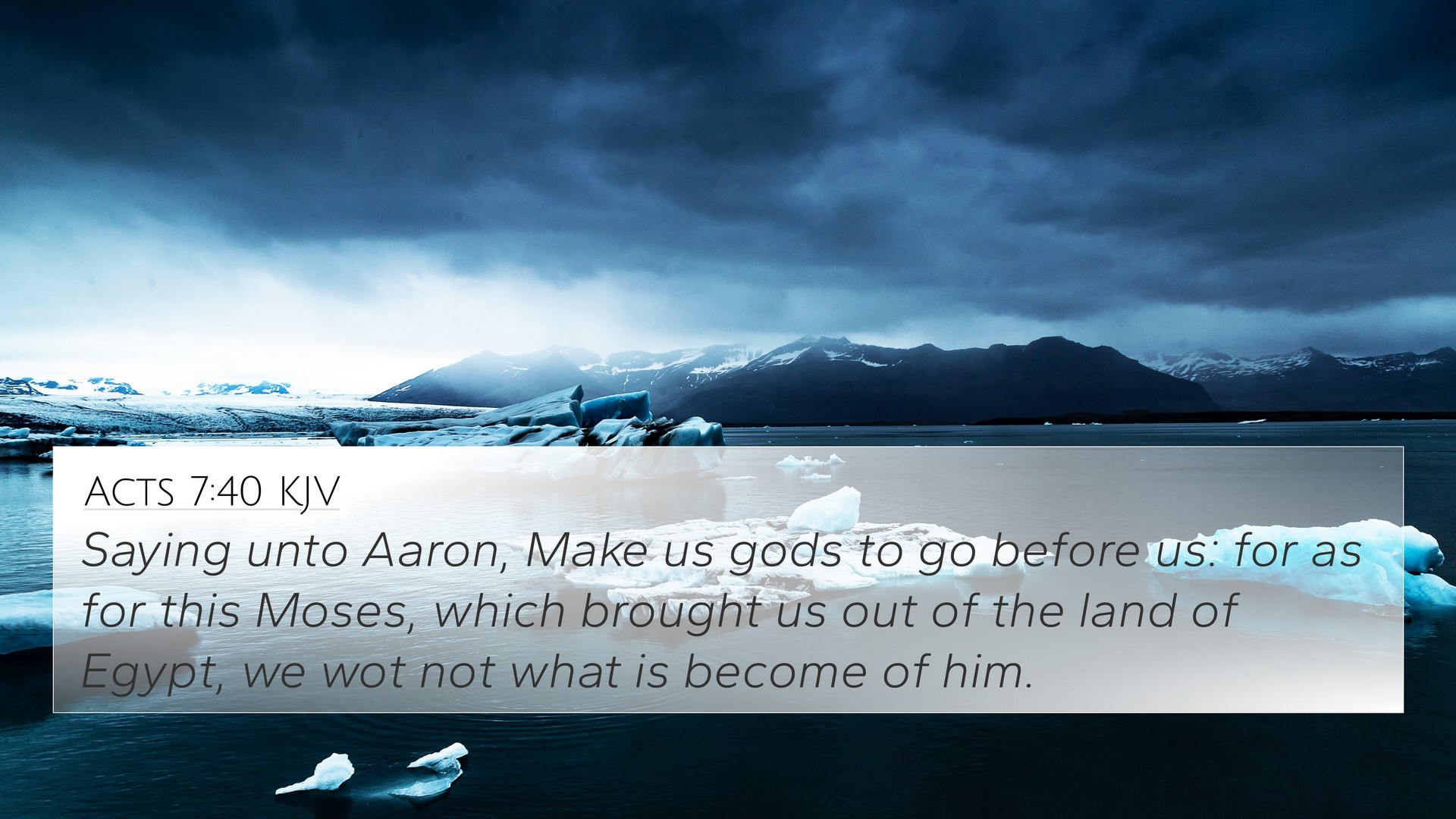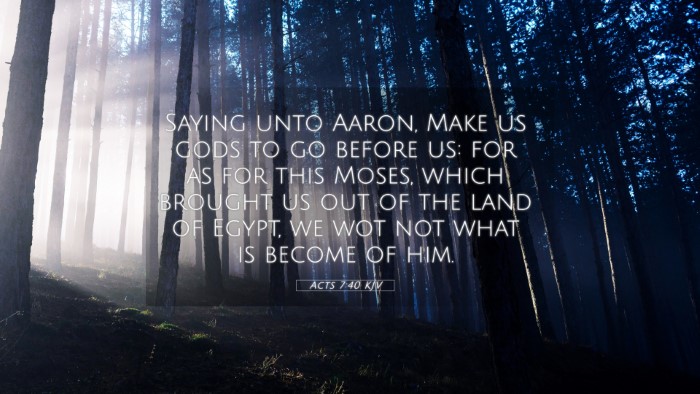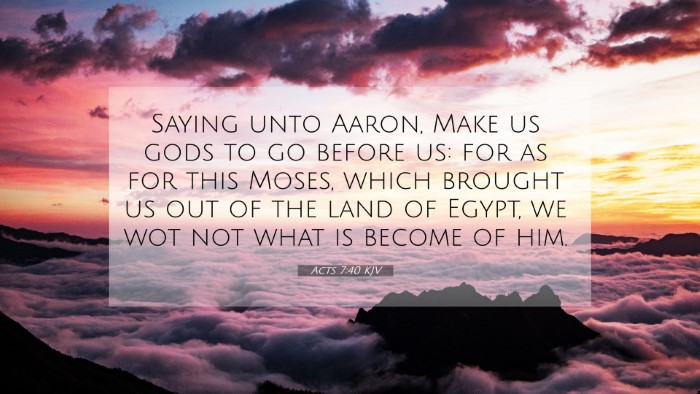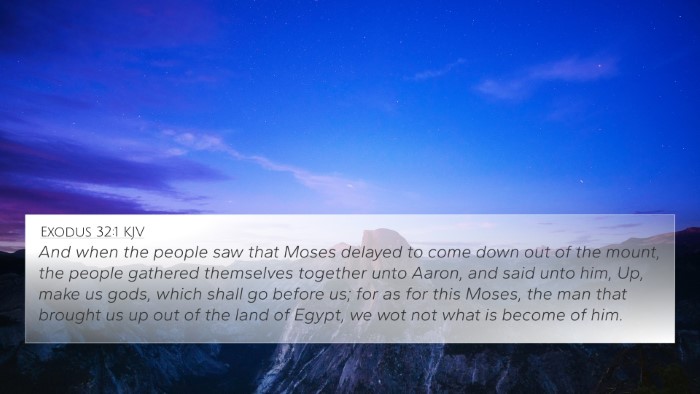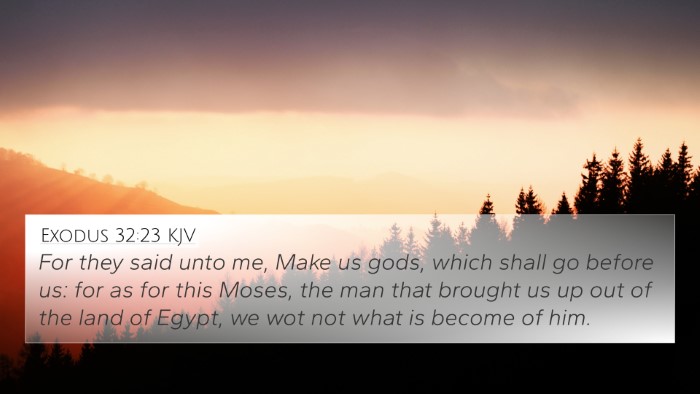Understanding Acts 7:40
Acts 7:40 states, "saying unto Aaron, Make us gods to go before us; for as for this Moses, which brought us out of the land of Egypt, we wot not what is become of him." This verse is part of Stephen's address before the Sanhedrin, where he recounts the history of Israel's rebellion against God.
This verse highlights the impatience and lack of faith exhibited by the Israelites during their time in the wilderness. They had witnessed miraculous events, yet when Moses delayed in coming down from the mountain, they sought to create their own gods.
Commentary Insights
-
Matthew Henry: Henry explains that the Israelites, having been led out of Egypt, quickly forgot the God who delivered them. Their desire for tangible gods illustrates their spiritual immaturity and the tendency of human nature to revert to idolatry when spiritual leadership is absent. He emphasizes the seriousness of their demand for idols, as it showed ingratitude and lack of trust in God.
-
Albert Barnes: Barnes notes that the phrase "we wot not what is become of him" reflects the uncertainty and fear of the people. They were anxious after Moses' prolonged absence, which caused them to turn to false gods. This indicates a weak faith that was unable to wait for God's timing. Barnes further connects this rebellion to the broader theme of Israel's disobedience throughout their history.
-
Adam Clarke: Clarke elaborates on the significance of Aaron's role in this incident. Instead of standing firm in faith, Aaron yielded to the people's demands. This illustrates a critical failure in spiritual leadership, showcasing how easily leaders can falter under pressure. Clarke also mentions that the request for gods indicates a yearning for visible representations of divinity, which shows the persistent struggle between faith in the unseen God and the desire for physical symbols.
Bible Verse Cross-References
Acts 7:40 is connected to several significant Bible verses that collectively illuminate the narrative of idolatry and rebellion among the Israelites:
- Exodus 32:1-4: The direct account of the Israelites creating the golden calf while Moses is on Mount Sinai.
- 1 Corinthians 10:7: Paul reflects on this event as an example of idolatry that should be avoided by believers.
- Psalm 106:19-23: This passage recounts the rebellion of Israel and their worship of an image, highlighting God's anger.
- Hebrews 3:16-19: The author warns against hardening hearts as the Israelites did, leading them to peril.
- Galatians 4:8-9: Paul draws an analogy to turn back to idols, cautioning believers against a regression to former ways.
- Isaiah 40:18: This verse questions the worthiness of creating an image like God, emphasizing His incomparability.
- Jeremiah 2:13: God laments how His people have forsaken Him, the fountain of living waters, to dig broken cisterns.
- Romans 1:23: Paul discusses how people exchange the glory of God for images, drawing a line to the same themes in Acts.
- Deuteronomy 9:12-14: God's warning to Moses that the people had turned corrupt and made idols.
- Acts 7:39: The preceding verse also describes how the Israelites turned back to Egypt in their hearts, foreshadowing their idolatrous actions.
Thematic Bible Verse Connections
The theme of idolatry in Acts 7:40 resonates through various Biblical narratives, showing a repeated pattern across both the Old and New Testaments. The longing for physical representations of deity is a significant motif that sheds light on human frailty in faith. Understanding these connections can enrich one's study through tools for Bible cross-referencing and thematic analysis.
Through comparative Bible verse analysis, we see the interconnectivity between the experiences of Israel in the wilderness and the warnings to the early church. Such a dialogue across scripture emphasizes the lessons of patience, faith, and the consequences of turning away from God.
Conclusion
Acts 7:40 serves as a critical reminder of the dangers of idolatry and lack of faith. By examining this verse alongside its cross-references, believers can gain a deeper understanding of God's character, the nature of sin, and the calls to faithfulness throughout scripture. This inter-Biblical dialogue enriches our comprehension of biblical themes, uniting the faithful across generations under the guidance of God's Word.
